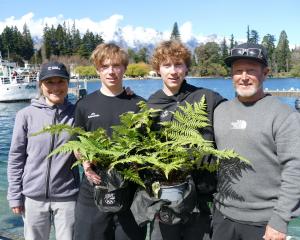When the Olympic Games were held in Beijing in 2008, Fiona Bourke was still a novice rower.
She joined the Otago University club in 2007 and won the novice double sculls with Genevieve Martin at the national championships at Lake Karapiro in 2008.
"I remember thinking as an 11-year-old that I would like to go to the Olympics," Bourke (24) told the Otago Daily Times from the New Zealand training base in Switzerland. "But never did I think it would be to compete.
" I was never a sporty kid, but once I began rowing at university, it took me about 12 months to realise that I wanted to compete at the Olympics.
"I had always wanted to row but had no opportunities when I lived at Takapau in Hawkes Bay.
"I'd never played any sport before I started university. I was tall and my friends told me to try rowing. I caught the rowing bug and never looked back."
Bourke developed her rowing technique during the three years she spent in Dunedin studying for a double degree in commerce and chemistry at the University of Otago.
Bourke was a member of the New Zealand quadruple sculls crew that finished sixth in the final of the world championships at Lake Karapiro in 2010.
She gained selection after being a member of the New Zealand eight that finished runner-up to the United States at the world under-23 championships in Belarus earlier that year.
Last year, at the Bled world championships, the Richard Tonks-coached New Zealand crew of Sarah Gray, Bourke, Louise Trappitt and Eve MacFarlane won bronze in the women's quadruple sculls final, finishing 9sec behind winner Germany.
It has been a rocky year for the crew in the build-up to London because Gray and Bourke have had injuries that have kept them out of the boat.
Gray injured her back and Bourke had stress fractures in three of her ribs.
"Sarah has been injured since the end of January and we have been rowing for a long time with her in and out of the boat," Bourke said.
"I spent five weeks out of the boat trying to mend my ribs. It was a painful and frustrating experience.
"I am pleased to be on the upside of my injury now, and am taking special precautions with training to ensure that I can maintain my rib health over the final month of training"
The injury disruptions hindered the New Zealand crew's performances in the World Cup series.
"But we are focused on London, and taking the time now to get injuries healed correctly was important and we will be a stronger crew, come race day in London," she said.
The rib injuries kept Bourke and Gray out of the first World Cup but the two reserves rose to the challenge and the crew finished fourth.
"A couple of the top crews were missing and we knew the competition would ramp up by the time we met again in Munich," Bourke said.
All the medal contenders were in action at Munich. The New Zealand crew had only a week back together in the boat before the race.
"We tried out a new seating arrangement and racing was a true reflection of the time we had to gel in this new combination," Bourke said, "We were not discouraged by our fifth place. We are now soldiering on through some tough training to get us to London in the best shape possible."
Bourke has spent the past six weeks in Switzerland with the New Zealand rowing team.
They are based at the small town of Ageri, at a 5km lake that sits at an altitude of 850m and travel from there to World Cup events.
The standard of racing at World Cup regattas has improved dramatically this year.
"We knew this would happen in Olympic year," Bourke said.
"Everybody has their eyes on the prize, an Olympic gold medal.
"Most countries do not finalise their Olympic line-ups until after the World Cup series. They use the racing as a selection tool.
"Athletes' Olympic hopes are on the line and this makes for more fierce racing."
Bourke said the confidence in the New Zealand camp was high.
"We have an amazing and experienced team of coaches and support staff in whom we trust," she said.
"We know that come race day they will have us turn up on the start line in the best shape possible to deliver our greatest performance."
New Zealand Rowing is riding high and fans expect a bag full of medals at the Olympics.
Success will come from the heavy and dedicated training.
"We were grinding out 270km a week on the water before we left New Zealand," Bourke said.
"We also had two weight sessions a week." The time on the water was reduced to 240km a week during the World Cup and training will be reduced as crews taper before the Olympic regatta.
But it is not all hard work. The rowers have time to relax by "watching movies, reading books or assuming the fetal position as we try to recover before the next gruelling session," Bourke explained.
"I have not yet completed my university studies so would usually spend some time with my head in the books, but have taken a break this year as I focus on London."
Bourke acknowledged the support she has had from family, friends, the Otago University Rowing Club and funding from the Skeggs Foundation.
Fiona Bourke
Olympic rower
Age: 24.
Home town: Takapau, Hawkes Bay.
Occupation: Commerce and chemistry student.
Club: Otago University.
Coaches: Glen Sinclair, Sonya Walker, Dick Tonks.
NZ rep: 2010-12.
NZ champion: Novice pair (2008), premier eight (2011), premier quadruple sculls (2012).
International record: Under-23 eights, 3rd (2010); world championship quadruple sculls , 6th (2010); 3rd (2011).
Olympic event: Quadruple sculls (Richard Tonks coach, Sarah Gray, Fiona Bourke, Louise Trappitt, Eve MacFarlane).












